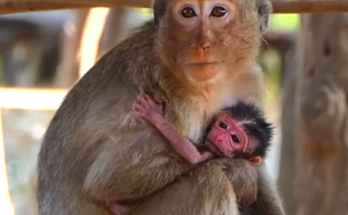The forest floor is never a safe place for a newborn, yet this tiny life found itself lying helplessly on the cold, rough ground. The little baby, barely hours old, was struggling to move, its small body trembling as though the world around it was already too heavy to bear. Its fragile cries pierced the silence, a desperate call for warmth and comfort that should have come from its mother. But the mother stood a short distance away, hesitant, unwilling, and perhaps even rejecting her own child.
For many, watching such a moment is deeply heartbreaking. A newborn’s first moments are supposed to be filled with safety, closeness, and the nurturing bond of a mother’s touch. Instead, this baby was left alone, its soft eyes searching, its tiny hands reaching into the empty air. The ground was no cradle; it was a cold, uncaring surface that offered no comfort.
The mother’s behavior raised questions. Was she too young and inexperienced to know how to care for her baby? Was she frightened or stressed by the surroundings? Or was the baby weak, different, or somehow not accepted by her? In the animal world, rejection is not uncommon, but each time it happens, it carries a pain that feels almost human. To see a mother turn away from her newborn strikes at the heart of anyone watching.
As the minutes passed, the cries grew weaker. The tiny baby’s struggle to survive without warmth or nourishment reflected the cruel reality of nature. Yet, there was also a quiet strength in the newborn’s determination to keep fighting. Every breath, every tiny movement, was a sign of life refusing to give up, no matter how much the odds were stacked against it.
Observers could only hope that compassion would win—that the mother might change her mind, overcome her hesitation, and return to lift her baby off the ground. A mother’s embrace would mean everything: safety, nourishment, and the chance to live. Without it, survival seemed nearly impossible.
The scene left many with heavy hearts. A newborn lying helplessly on the ground is not just a moment in nature—it is a reminder of vulnerability, of the fragile line between life and death, and of how essential love and care are in the very first moments of existence.


